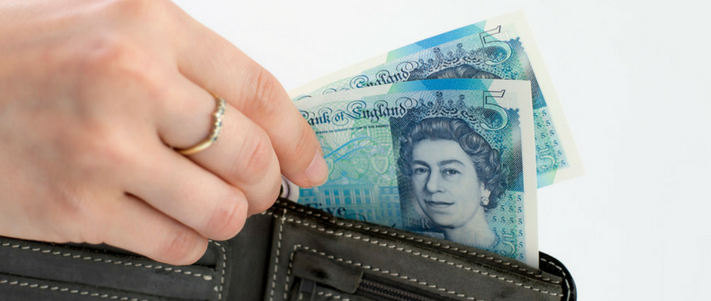
- More than half prefer the new polymer banknotes as they are ‘cleaner and more hygienic’
- But 29% want paper notes back and fear the polymer versions are ‘easier to lose’ and prone to ‘sticking together’
The introduction of polymer notes to replace old paper money is proving popular with consumers, new research from Consumer Intelligence ahead of the launch of a plastic tenner on September 14th.
The Bank of England introduces the new £10 note next month featuring literary legend Jane Austen to join the plastic £5 note which was launched last September.
Plastic cash has been the focus of controversy with religious groups and vegans and vegetarians objecting to animal fats being used in their production as well as a campaign to ensure famous women are represented on the notes.
But the majority of people back the new currency – 51% say they prefer polymer notes to the old paper money which is being gradually phased out with a polymer £20 note due by 2019 featuring artist JMW Turner. Some 29% said they preferred the old paper money, and the remainder said they didn’t care either way.
The top reasons for the new notes’ popularity was the belief that the new notes feel cleaner and more hygienic (67%) and that the plastic cash feels modern (52%). Around 6% of people claim to like reading the new serial numbers.
But the new note’s toughness is more important than its security features, according to the study. Around two-fifths (40%) prefer the new note because it doesn’t fall apart after being in the washing machine, whereas 27% prefer it for its anti-forgery security features which were the main reason for the Bank of England’s switch. Around 77% say plastic cash is more robust.
Of those who don’t like the new fiver, 59% don’t like how it feels; a third (33%) believe it’s easier to lose than the old fiver; and 30% believe the new notes are prone to sticking together.
Nearly two-thirds of consumers (62%) are aware that a new £10 note will be issued next month. However only one-in-five people (18%) knew it would feature Jane Austen.
Nearly two-fifths of adults in the UK (39%) have never read an Austen novel and have no intention of doing so. However screen adaptations of her works have proved more popular as 51% say they have watched Pride and Prejudice on TV.
Ian Hughes, Chief Executive of Consumer Intelligence said:
“Change is often not popular and there has been a lot of controversy about the polymer notes over the past year.
“But there is clear public support for the new currency and in an age where contactless payment is growing fast it is fascinating that the public remain so invested in cash.
“There are no plans as yet to convert the £50 note into plastic so supporters of paper money have something to hang on to.”
Around 14% of adults asked for Princess Diana’s image when asked to choose one famous British woman for the next new note ahead of 11% who want Margaret Thatcher. Other choices included authors Beatrix Potter and Agatha Christie and singer, Adele.
Ends
Notes to Editors
For further information, please contact:
Consumer Intelligence
Tom Flack
07731191543
Kevan Reilly / Jonathan Flint
Citigate Dewe Rogerson
020 7638 9571
About Consumer Intelligence
Consumer Intelligence conducts consumer surveys and benchmarks price and service performance providing unique insights into competitor pricing and customer experiences, their attitudes, opinions and behaviours. For more information, visit the web site www.consumerintelligence.com


Comments (1)